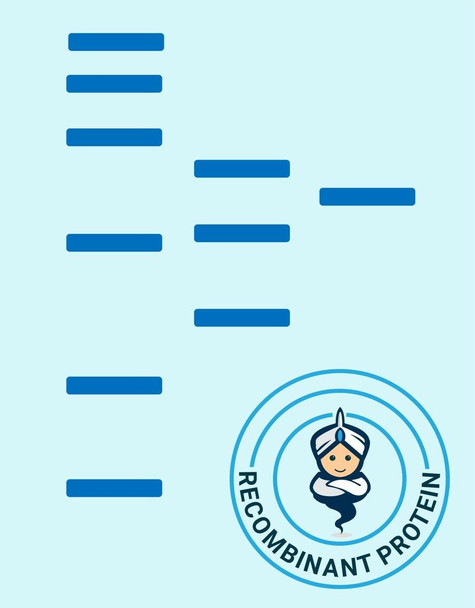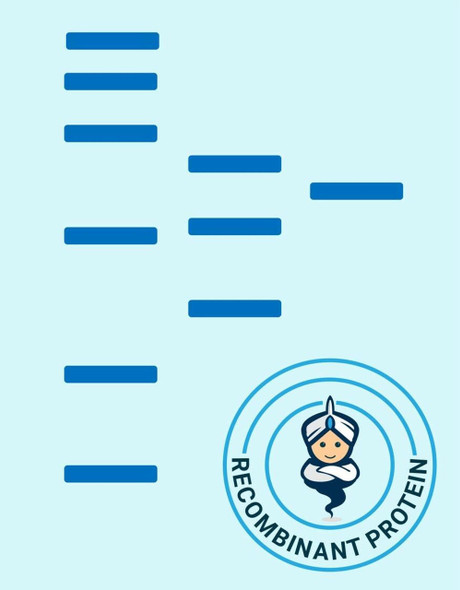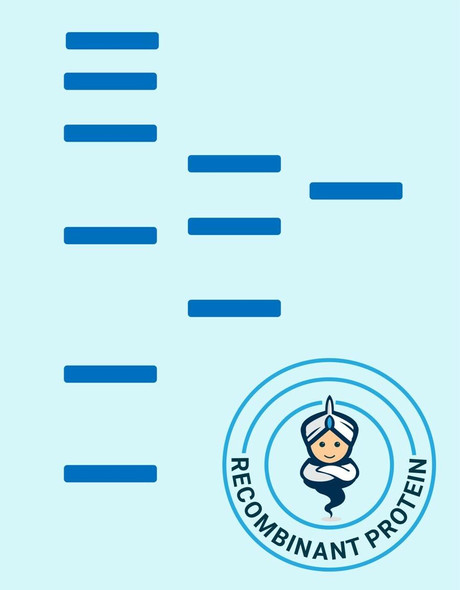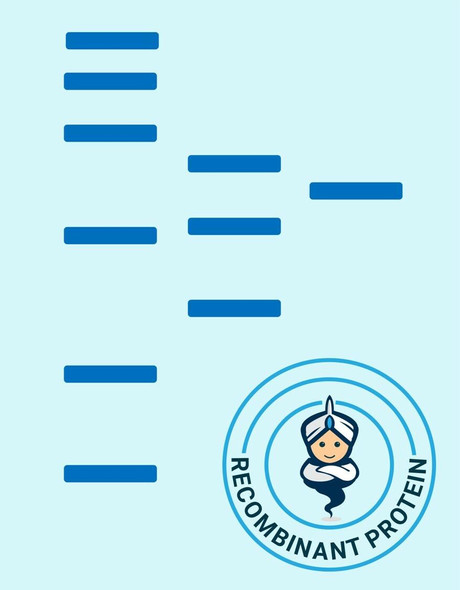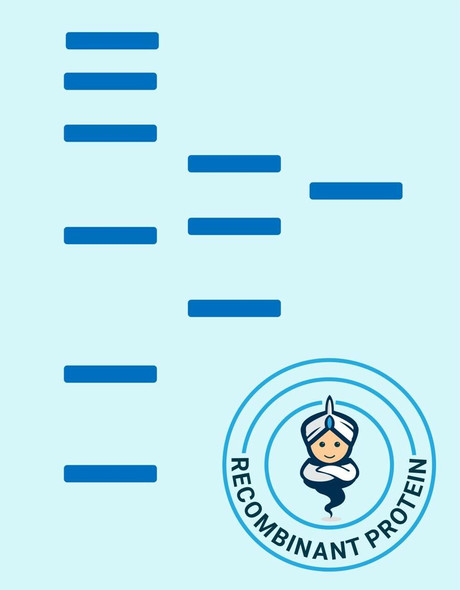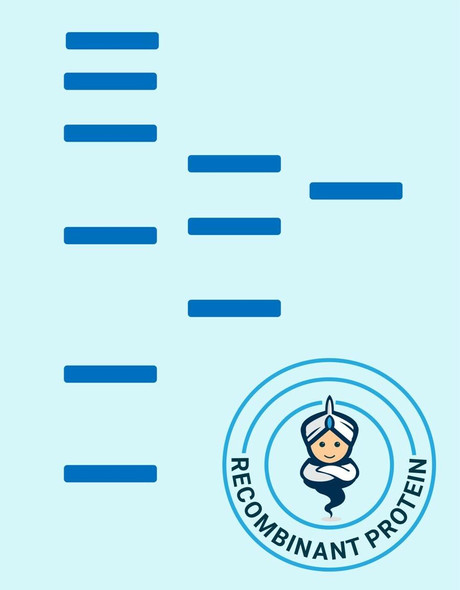Description
| Product Name: | Human NSDHL Recombinant Protein |
| Product Code: | RPPB4125 |
| Size: | 5µg |
| Species: | Human |
| Target: | NSDHL |
| Synonyms: | H105E3, SDR31E1, XAP104, Sterol-4-alpha-carboxylate 3-dehydrogenase, decarboxylating, Protein H105e3, NSDHL. |
| Source: | Escherichia Coli |
| Physical Appearance: | Sterile Filtered clear solution. |
| Formulation: | The NSDHL solution (0.25mg/ml) contains 20mM Tris-HCl buffer (pH8.0), 10% glycerol and 0.1M NaCl. |
| Stability: | Store at 4°C if entire vial will be used within 2-4 weeks. Store frozen at -20°C for longer periods of time. For long term storage it is recommended to add a carrier protein (0.1% HSA or BSA).Avoid multiple freeze-thaw cycles. |
| Purity: | Greater than 80% as determined by SDS-PAGE. |
| Amino Acid Sequence: | MGSSHHHHHH SSGLVPRGSH MGSMEPAVSE PMRDQVARTH LTEDTPKVNA DIEKVNQNQA KRCTVIGGSG FLGQHMVEQL LARGYAVNVF DIQQGFDNPQ VRFFLGDLCS RQDLYPALKG VNTVFHCASP PPSSNNKELF YRVNYIGTKN VIETCKEAGV QKLILTSSAS VIFEGVDIKN GTEDLPYAMK PIDYYTETKI LQERAVLGAN DPEKNFLTTA IRPHGIFGPR DPQLVPILIE AARNGKMKFV IGNGKNLVDF TFVENVVHGH ILAAEQLSRD STLGGKAFHI TNDEPIPFWT FLSRILTGLN YEAPKYHIPY |
NAD (P) Dependent Steroid Dehydrogenase-Like (NSDHL) takes part in synthesis of cholesterol. NSDHL is involved in one of a few steps which convert lanosterol to cholesterol by removing a carbon atom and three hydrogen atoms (a methyl group). NSDHL is also a vital element of cell membranes and myelin, the fatty covering that insulates nerve cells.
NSDHL Human Recombinant produced in E. coli is a single polypeptide chain containing 320 amino acids (1-297) and having a molecular mass of 35.5kDa. NSDHL is fused to a 23 amino acid His-tag at N-terminus & purified by proprietary chromatographic techniques.
| UniProt Protein Function: | NSDHL: Defects in NSDHL are the cause of congenital hemidysplasia with ichthyosiform erythroderma and limb defects (CHILD). CHILD is an X-linked dominant disorder of lipid metabolism with disturbed cholesterol biosynthesis, which typically results in male lethality. Clinically, it is characterized by congenital, unilateral, ichthyosisform erythroderma with striking lateralization, sharp midline demarcation, and ipsilateral limb defects and hypoplasia of the body. Limbs defects range from hypoplasia of digits or ribs to complete amelia, often including scoliosis. Defects in NSDHL are the cause of CK syndrome (CKS). CKS is a disorder characterized by mild to severe cognitive impairment, seizures, microcephaly, cerebral cortical malformations, dysmorphic facial features, and thin body habitus. Belongs to the 3-beta-HSD family. |
| UniProt Protein Details: | Protein type:Membrane protein, integral; Lipid Metabolism - steroid biosynthesis; Oxidoreductase; Endoplasmic reticulum; EC 1.1.1.170 Chromosomal Location of Human Ortholog: Xq28 Cellular Component: endoplasmic reticulum membrane; intracellular membrane-bound organelle; endoplasmic reticulum; integral to membrane; lipid particle Molecular Function:3-beta-hydroxy-delta5-steroid dehydrogenase activity; sterol-4-alpha-carboxylate 3-dehydrogenase (decarboxylating) activity Biological Process: smoothened signaling pathway; hair follicle development; cholesterol biosynthetic process Disease: Congenital Hemidysplasia With Ichthyosiform Erythroderma And Limb Defects; Ck Syndrome |
| NCBI Summary: | The protein encoded by this gene is localized in the endoplasmic reticulum and is involved in cholesterol biosynthesis. Mutations in this gene are associated with CHILD syndrome, which is a X-linked dominant disorder of lipid metabolism with disturbed cholesterol biosynthesis, and typically lethal in males. Alternatively spliced transcript variants with differing 5' UTR have been found for this gene. [provided by RefSeq, Jul 2008] |
| UniProt Code: | Q15738 |
| NCBI GenInfo Identifier: | 8488997 |
| NCBI Gene ID: | 50814 |
| NCBI Accession: | Q15738.2 |
| UniProt Secondary Accession: | Q15738,O00344, D3DWT6, |
| UniProt Related Accession: | Q15738 |
| Molecular Weight: | 373 |
| NCBI Full Name: | Sterol-4-alpha-carboxylate 3-dehydrogenase, decarboxylating |
| NCBI Synonym Full Names: | NAD(P) dependent steroid dehydrogenase-like |
| NCBI Official Symbol: | NSDHL�� |
| NCBI Official Synonym Symbols: | H105E3; XAP104; SDR31E1�� |
| NCBI Protein Information: | sterol-4-alpha-carboxylate 3-dehydrogenase, decarboxylating; protein H105e3; short chain dehydrogenase/reductase family 31E, member 1 |
| UniProt Protein Name: | Sterol-4-alpha-carboxylate 3-dehydrogenase, decarboxylating |
| UniProt Synonym Protein Names: | Protein H105e3 |
| UniProt Gene Name: | NSDHL�� |
| UniProt Entry Name: | NSDHL_HUMAN |

